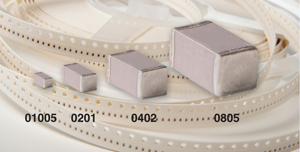Passive Plus, Inc. (PPI) has developed a series of Broadband Capacitors available in four different case sizes: 01005BB, 0201BB, 0402BB and 0805BB. Values available are 10nF (10,000 pF) and 100nF (100,000 pF).
These capacitors are intended primarily for coupling RF signals or, occasionally, for bypassing them to ground, while blocking DC. The applications for which they are intended require small, surface-mountable devices that provide low RF impedances, i.e., low insertion losses and reflections, across extremely large RF bandwidths and temperatures typically ranging from -55°C to +125°C.
Small, single layer capacitors, apart from not being surface-mountable, usually do not have sufficiently large capacitance values to cover the required frequency range, which may extend from the tens or hundreds of kHz to tens of GHz. Ordinary multi-layer capacitors, when operated over these ranges, display "parallel resonances," narrow frequency bands over which they have high impedances and insertion losses. The Passive Plus "BB" series overcomes these objections to achieve bandwidths as high as--in the case of the 0201BB104--a remarkable bandwidth of 16 kHz to > 50 GHz, Insertion Loss < 1 db, with a WVDC of 16 V.
Applications for the Broadband series are primarily found in the "signal integrity" market:
- Optoelectronics/highspeed data
- ROSA/TOSA (Transmit/Receive optical subassemblies)
- SONET (Synchronous Optical Networks)
- Broadband test equipment
- Broadband microwave and mmWave amplifiers and oscillators
In general, best results are achieved by capacitors that are close in width to that of the transmission line trace. Most trace widths on commonly used substrates that must function well above 12 GHz lie in the 8- to 24-mil range, and so 0402 and 0201 SMT devices are well suited to the applications.
To reiterate, customers requiring surface-mountable, 10 nF or 100 nF capacitors that provide resonance-free, low insertion loss, low reflection operation over extremely large RF bandwidths will be well served by PPI's BB series.

